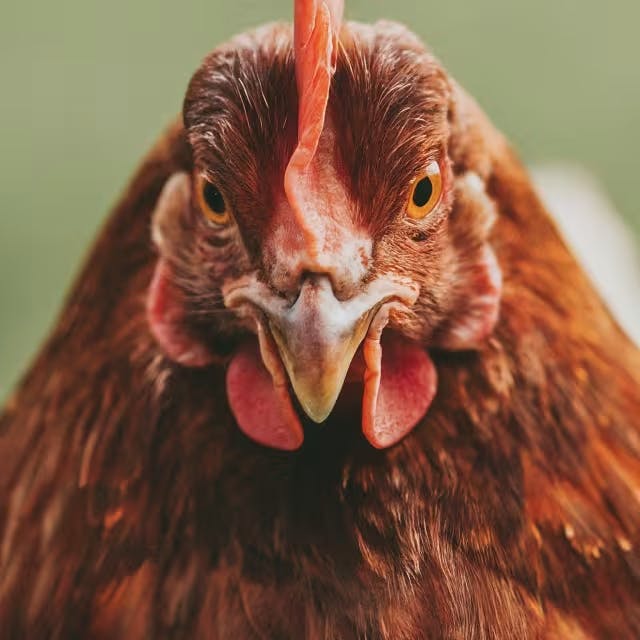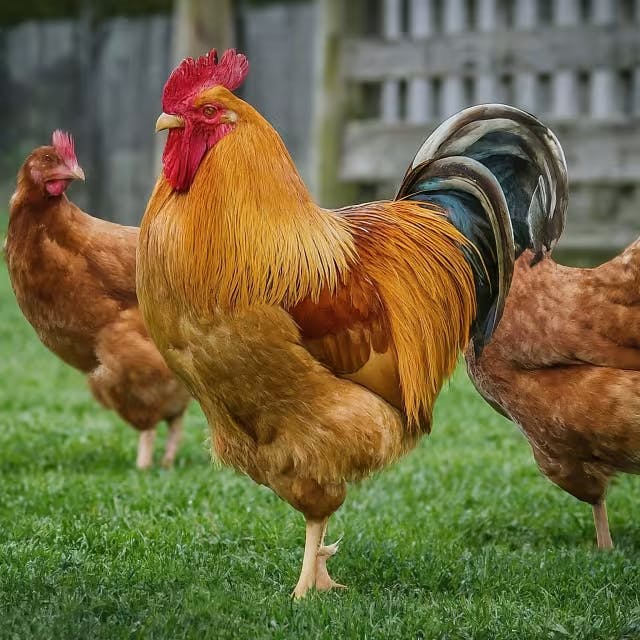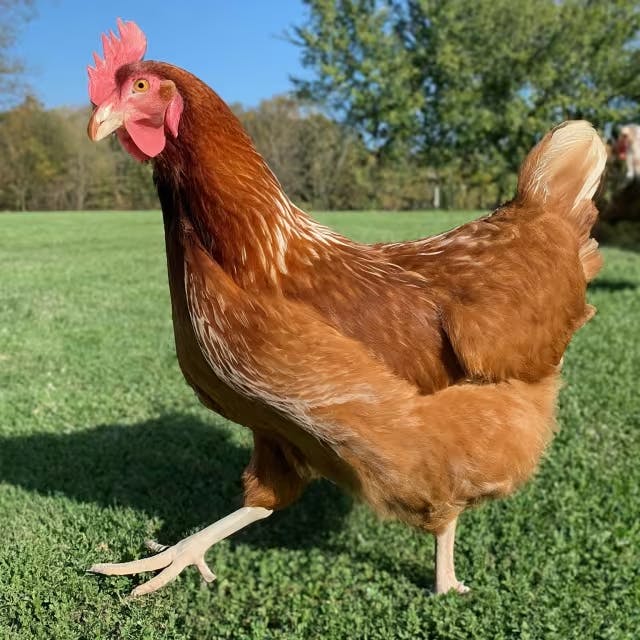The Delightful World of Backyard Chickens
Go4Turf
March 04, 2024

Embarking on the journey into the delightful world of backyard chickens offers a unique blend of joys and challenges, suitable for both novice and experienced poultry enthusiasts alike. From understanding the specific needs of various chicken breeds to ensuring their health and happiness through proper diet, shelter, and care, raising chickens in your backyard transforms into a rewarding endeavor. This comprehensive guide delves into key aspects such as selecting the right breed, building a comfortable coop, grasping chicken behavior and social dynamics, and adopting sustainable practices to maintain a healthy flock, providing readers with essential knowledge to succeed in the fascinating world of backyard poultry keeping.
Key Takeaways
Embarking on raising backyard chickens offers both joys and challenges, suitable for all levels of poultry enthusiasts.
Selecting the right chicken breed is crucial for aligning with your backyard environment and personal goals.
Building a comfortable coop is essential for the health and happiness of your chickens, requiring thoughtful consideration of space and safety.
Understanding chicken behavior and social dynamics is key to maintaining harmony within the flock and ensuring their well-being.
Adopting sustainable practices, such as reducing waste, benefits both the environment and the overall health of your chickens.

The Benefits of Raising Backyard Chickens
Exploring the delightful world of backyard chickens unfolds a myriad of benefits that might surprise you. For starters, chickens contribute significantly to pest control. By nature, these birds feast on bugs and insects, reducing the need for chemical pesticides. This not only aids in creating a more organic garden space but also complements gardening efforts, as seen in tips for a vibrant, healthy landscape.
Chickens also produce rich fertilizer through their manure. With proper composting, this by-product can be transformed into a nutrient-dense supplement for your garden beds, enhancing soil quality and plant growth. It echoes the sustainable cycle of growth and nutrition emphasized in DIY seed starting and potting mix practices.
Aside from their utilitarian benefits, chickens bring a unique joy and companionship to daily life. Their quirky behaviors and distinctive personalities make them entertaining pets that connect you more deeply with the cycle of life and nature. For egg-laying breeds, the reward of fresh eggs cannot be overstated. Unlike store-bought eggs, those from your backyard flock come with a higher nutritional value and richer taste, a direct result of the diverse diet you can offer them, including kitchen scraps and garden produce.
Lastly, the act of caring for these animals instills a sense of responsibility and connection to the food chain that is often lost in urban settings. This hands-on experience can be particularly enriching for children, fostering an appreciation for where food comes from and the work involved in producing it.
If you're considering delving into this rewarding hobby, understanding the basics of chicken care is paramount. Learn the essentials for a healthy flock, including choosing the right breeds, providing a comfortable habitat, and managing their diet and health effectively. By embracing these responsibilities, you unlock the full potential of the delightful world of backyard chickens, reaping benefits that extend beyond your garden and into your home.
Choosing the Right Chicken Breed for Your Backyard
Understanding your needs and the characteristics of various chicken breeds is the first step toward a rewarding backyard chicken experience. Whether you're looking for egg production, meat, dual-purpose breeds, or simply pets that enhance your backyard's charm, each breed brings something unique to the table. For example, White Leghorns are celebrated for their prolific egg-laying capabilities, while Cornish Crosses are unparalleled in meat production efficiency. However, it's not all about output; the temperament of your chickens can significantly affect your daily interactions and the overall vibe of your backyard space.
Seeking birds from certified sources such as those compliant with the National Poultry Improvement Plan (NPIP) is crucial for a healthy flock. This ensures your chickens are not just productive but also thriving and disease-free. Dive deeper into selecting the appropriate chicken breed that aligns with your backyard aspirations and learn how to create a haven for them with insights from the Tiki Coop article. This careful consideration and preparation pave the way for a delightful world of backyard chickens that is as enriching as it is enjoyable.
Essential Tips for Building a Chicken Coop
When embarking on the adventure of keeping backyard chickens, creating a secure and comfortable coop is paramount. A well-designed chicken coop not only offers protection from predators but also ensures your chickens stay healthy and happy. Consideration of space is critical; each chicken requires at least 3-4 square feet inside the coop and about 10 square feet in an outdoor run. Adequate ventilation is another crucial factor, as good air circulation prevents respiratory issues and keeps the coop odor-free.
Selecting the right materials can make a significant difference in durability and maintenance. For instance, using hardware cloth instead of chicken wire provides better protection against predators. Including a laying area with one nest box per three hens allows for comfortable egg laying. Don't forget to integrate food and water stations that are easily accessible yet designed to minimize mess.
For those who also have a green thumb, incorporating tips on ensuring plant health and growth next to your coop can lead to a symbiotic environment where chickens help with pest control while contributing to soil fertility.
Investing time in planning and building a chicken coop that meets these criteria will not only make the daily care routine more manageable but also enrich the delightful world of backyard chickens for you and your feathered friends.

Understanding Chicken Behavior and Social Dynamics
The pecking order in the delightful world of backyard chickens plays a pivotal role in maintaining peace and order within the flock. This fascinating social hierarchy, first identified by Thorleif Schjelderup-Ebbe in 1921, dictates access to resources such as food, water, and prime roosting spots. Chickens establish their rank early on, as chicks as young as six weeks begin displaying behaviors that determine their standing within the group. The social dynamics among chickens are influenced by various factors including age, size, breed, and personality, leading to a complex yet essential system for harmony in the backyard. To further explore the intricacies of chicken social structures and behaviors, this detailed exploration offers a deep dive into the subject.

Raising Chickens Sustainably: Tips for Reducing Waste
Embracing the deep litter method in your coop represents a significant stride towards sustainability in the delightful world of backyard chickens. By allowing the bedding material—be it mulch, sawdust, or pine shavings—to decompose inside the coop, you're effectively transforming potential waste into rich compost. This compost can then be used to enhance garden soil fertility, contributing to healthier plant growth. Moreover, this method benefits your feathered friends too, fostering beneficial microorganisms that help keep pathogens at bay.
Adopting such practices not only minimizes waste but also enriches the environment of your backyard ecosystem. It's vital, however, to maintain a balanced addition of fresh bedding over time to ensure the process works effectively.
For those looking to integrate their chicken-keeping with other eco-friendly gardening practices, creating biodegradable newspaper pots offers a splendid synergy, making use of recycled materials and supporting sustainability. Similarly, exploring innovative composting ideas can provide further inspiration on how to use compost in enriching your garden, closing the loop in your sustainability efforts.
By incorporating these simple yet impactful practices, backyard chicken enthusiasts can enjoy the myriad benefits of keeping chickens while actively contributing to environmental conservation. For more details on implementing the deep litter method to its full potential, consider exploring further resources here. Delving into the delightful world of backyard chickens enriches lives by fostering a deeper connection with nature, enhancing our understanding of sustainable living, and providing the simple pleasure of caring for these fascinating creatures. With the right breed selection, a properly designed coop, and an insightful approach to their care and social structure, anyone can unlock the multifaceted benefits these birds bring to our lives and gardens. Embracing this journey not only introduces us to the joys of fresh eggs and natural pest control but also teaches valuable lessons in responsibility, the importance of sustainability, and the wonders of the natural world.
Frequently Asked Questions
How do backyard chickens contribute to pest control and a healthier garden?
Backyard chickens contribute to pest control by naturally feasting on bugs and insects, reducing the reliance on chemical pesticides. Their manure can be composted into a rich fertilizer, nourishing the garden soil and promoting healthier plant growth. These sustainable practices foster a vibrant and organic garden environment.
What are the benefits of using chicken manure in your garden?
Using chicken manure in your garden introduces a rich, nutrient-dense supplement for enhancing soil quality and promoting robust plant growth. It effectively transforms into a powerful fertilizer with proper composting, elevating the health and vibrancy of garden beds. This cycle of sustainability supports not only a thriving garden but also emphasizes an organic approach by reducing the need for chemical pesticides, thanks to chickens' natural pest control actions.
How do backyard chickens enhance the quality and nutritional value of eggs compared to store-bought ones?
Backyard chicken eggs often surpass store-bought ones in nutritional value and taste because of the varied diet you can provide, including kitchen scraps and fresh garden produce. This diverse diet results in eggs with a richer flavor and potentially higher nutrient levels. Additionally, the closer connection to the food chain and involvement in the egg production process fosters a greater appreciation for where food comes from, adding a unique value that goes beyond nutrition alone.
What factors should you consider when choosing the right chicken breed for your backyard?
When choosing the right chicken breed for your backyard, consider: egg production or meat yield you're aiming for, breed temperament for a harmonious backyard, space requirements for coop and run, and the health and disease resistance of the breed. Research breeds that fit your specific needs, whether for egg-laying, meat production, or simply as pets. Ensure your choice aligns with your backyard aspirations, space, and ability to provide care, creating a rewarding experience for both you and your chickens.
What are the essentials for creating a secure and comfortable chicken coop?
When setting up a secure and comfortable chicken coop, prioritize protection by using hardware cloth for durability against predators and ensure ample space, allocating at least 3-4 square feet per chicken inside the coop and 10 square feet in an outdoor run. Adequate ventilation is essential for health, and incorporating a laying area with one nest box for every three hens supports egg-laying comfort. Additionally, installing accessible food and water stations that minimize mess is crucial for daily maintenance.
How does the pecking order affect the social dynamics within a flock of backyard chickens?
The pecking order significantly impacts the social dynamics within a backyard chicken flock by establishing a hierarchy that dictates access to resources like food, water, and preferred roosting spots. This order, determined through various behaviors and influenced by factors such as age, size, breed, and personality, is essential for maintaining harmony and minimizing conflicts among chickens. Understanding and managing this social structure are crucial for the well-being of the flock and the smooth operation of a backyard chicken environment.